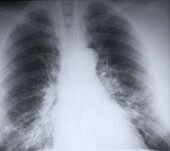Treatment
Once lung cancer is found, staging tests are done to find out if the cancer has spread.
Surgery
Surgery involves removing the tumor and nearby tissue. Lymph nodes may also need to be removed. The type of surgery depends on the location of the tumor, such as:
- Segmental or wedge resection—removal of only a small part of the lung
- Lobectomy —removal of an entire lobe of the lung
- Pneumonectomy—removal of an entire lung
Radiation Therapy
Radiation therapy is the use of radiation to kill cancer cells and shrink tumors. This may also be used to relieve symptoms, such as shortness of breath. Radiation may be:
- External—directed at the tumor from a source outside the body (more common for treating lung cancer)
- Internal—radioactive materials placed into the body in or near the cancer cells
Chemotherapy
Chemotherapy is the use of drugs to kill cancer cells. This may be given in many forms, including pill, injection, and via a catheter. Chemotherapy is often used to kill lung cancer cells that have spread to other parts of the body.
Promising New Treatments
These two types of treatments are not yet widely used. The National Cancer Institute considers these potential therapies:
- Photodynamic therapy (PDT)—a type of laser therapy. A chemical is injected into the bloodstream. It is then absorbed by the cells of the body. The chemical rapidly leaves normal cells. It will remain in cancer cells for a longer time. A laser aimed at the cancer activates the chemical. This chemical then kills the cancer cells that have absorbed it. This treatment may also be used to reduce symptoms.
- Cryosurgery—a treatment that freezes and destroys cancer tissue
If you are diagnosed with lung cancer, follow your doctor's instructions .
Please be aware that this information is provided to supplement the care provided by your physician. It is neither intended nor implied to be a substitute for professional medical advice. CALL YOUR HEALTHCARE PROVIDER IMMEDIATELY IF YOU THINK YOU MAY HAVE A MEDICAL EMERGENCY. Always seek the advice of your physician or other qualified health provider prior to starting any new treatment or with any questions you may have regarding a medical condition. Copyright © 2024 EBSCO Publishing All rights reserved.

 Lung Cancer Patients, How Do They Receive Their Radiation And Chemotherapy Treatments? - Dr. Sanderson (VIDEO)
Lung Cancer Patients, How Do They Receive Their Radiation And Chemotherapy Treatments? - Dr. Sanderson (VIDEO)


